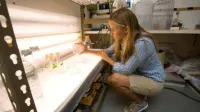Trees can capture 20 percent of a country's carbon emissions
Figure of the day: In a country where half of the surface is covered by forests (such as Spain), trees capture 20 percent of that country's CO2 emissions. This nice information masks two facts: we still have 80 percent of those emissions still to reduce and that the group that is currently spreading this information, the FBYCC (Forum of Forests and Climate Change) is asking for forest owners to be compensated. Seventy percent of Spanish forestsare h



.jpg)















